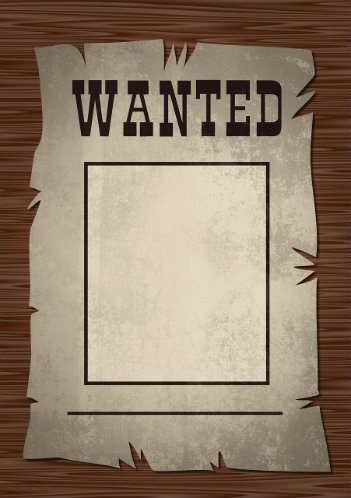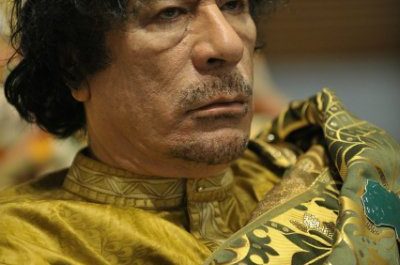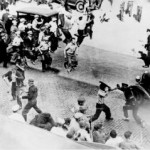Moammar Gadaffi-The Longest Serving African Leader
Moammar Gaddafi rose from his humble beginnings to a reputation as a ruthless leader. While ruling Libya for four decades, Gaddafi punished resistance with torture and death.
As the longest-serving African leader, Gaddafi’s grandiose opinion of himself, along with unpredictable behaviors, led some people to consider him as emotionally unstable.
led some people to consider him as emotionally unstable.
Learn about the dictator’s rise to power, his ruthlessness as a leader, the defiance, and mysteries surrounding his capture and death.
Who Was Moammar Gaddafi?
Born in Sirte in 1942, the future ruler of Libya did not live in luxury. His father was a Bedouin farmer.
The Washington Post explains that while in school, Gaddafi became friends with several young men who later assisted him as his co-conspirators. He attended a military college, received additional military training in Great Britain, received technical training and eventually, obtained a master’s degree in history.
Some sources make mention of Gaddafi’s intelligence. NPR reveals information from David Mack, former ambassador to the United Arab Emirates, who says that he was very intelligent with a high IQ. However, Mack also described Gaddafi as unstable.
In spite of his apparent emotional instability, he carefully planned to take control of Libya.
The Dictator’s Rise To Power
Gaddafi carried out a coup against then-ruler King Idris while the king received medical care in Turkey. At the time of the successful September 1969 coup, Gaddafi was only in his late 20s. Already demonstrating a grandiose opinion of himself, he envisioned himself as a new type of leader. However, he was apparently the only one, outside of his closest co-conspirators, perhaps, that shared his view of him.
He created what he called the “Libyan Arab Republic” and wrote a sometimes-rambling publication that he called the “Green Book.” The Green Book was basically an account of Gaddafi’s vision for Libya.
However, his iron fist rule soon became apparent, both against other countries and his own people. When he seized power in Libya, he ordered U.S. and British military forces out of Libya, yet invited radical groups from around the world into Libya.
Acts Of Terrorism
In 1986, several world leaders, including President Ronald Reagan, held Moammar responsible for the bombing of a nightclub in Berlin, recognized as a popular entertainment spot for American soldiers. The bombing resulted in the deaths of two U.S. servicemen and a woman from Turkey. The U.S. responded by bombing Tripoli and Benghazi, allegedly killing Gaddafi’s adopted daughter.
In December 1988, he brought down PanAm Flight 103 over Lockerbie, Scotland, killing all 259 people on the plane and 11 people on the ground. After implementation of U.S. and United Nations sanctions, the dictator suddenly became a friend of the U.S.
However, in 2003, the dictator reportedly admitted to attempting to develop an arsenal of weapons. He vowed to dismantle his unconventional weapons.
It was not unusual to hear news reports of Gaddafi’s forces killing known protestors in the streets of Libya. Reports  emerged over the years that Gadhafi fired on civilians to keep power for himself and away from rebel-led forces. One such report came from the U.K. Telegraph, with Middle East Correspondent Richard Spencer reporting that Gaddafi’s security forces fired on protestors while hiding inside secure compounds. While rebels took control of some regions, he vowed to fight not only to the last man but to the very last woman in order to continue his rule over Libya.
emerged over the years that Gadhafi fired on civilians to keep power for himself and away from rebel-led forces. One such report came from the U.K. Telegraph, with Middle East Correspondent Richard Spencer reporting that Gaddafi’s security forces fired on protestors while hiding inside secure compounds. While rebels took control of some regions, he vowed to fight not only to the last man but to the very last woman in order to continue his rule over Libya.
Mystery Surrounding His Whereabouts And Death
After some of his own forces tired of his human rights violations, Gaddafi vowed to die a martyr, refusing to surrender. His last days alive became somewhat of a mystery as rumors varied considerably. Some sources claimed Gaddafi’s whereabouts were not known, while others claimed the dictator and his family safely escaped.
There was reported confusion about where Gaddafi was. Some sources announced the capture of Gaddafi, while others claimed he died. He did die in October 2011, although it was unclear whether the fatal shots came from his security forces or rebel fighters. Civilians likely did not care, as they celebrated the end of violent, oppressive rule under Moammar Gaddafi.







